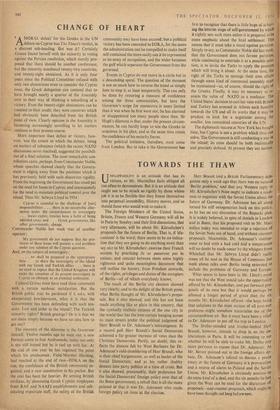TOWARDS THE THAW
UNFLAPPABILI1Y is an attitude that has its virtues, as Mr. Macmillan feels obliged all too often to demonstrate. But it is an attitude that ought not to be struck so rigidly by those whose job it is to be flexible that they freeze themselves into perpetual immobility. History moves, and so should those who would wish to make it.
The Foreign Ministers of the United States, Britain, France and Western Germany will all be in Paris by Sunday; and their first discussions, that very afternoon, will be about Mr. Khrushchev's proposals for the future of Berlin. That is, if 'dis- cussions' is the word; there seems to be no indica- tion that they are going to do anything more than say niet to Mr. Khrushchev; exercise their French accents by practising us ne passeront pas in unison; and concoct between them some highly righteous and quite meaningless document that will outline the history, from Potsdam onwards, of the rights, privileges and duties of the occupiers of Berlin—all of which everybody knows.
The result of the Berlin city election showed very clearly, and to the delight of the British press, what Berlin thought of Mr. Khrushchev's propo- sals. But it also showed, and this has not been made anything like so plain in this country, that the cynically realistic citizens of the one city in the world that has the iron curtain hanging across its main streets prefer the political judgment of Herr Brandt to Dr. Adenauer's intransigence. In a record poll Herr Brandt's Social Democrats achieved a far greater increase of votes than the Christian Democrats. Partly, no doubt, this re- flects the distaste felt by West Berliners for Dr. Adenauer's cold-shouldering of Herr Brandt, who is their chief burgomaster, as well as leader of the Social Democrats; and at his rather shabby descent into party politics at a time of crisis, But it also showed, presumably, their preference for the Social Democrats' foreign policy over that of the Bonn government; a rebuff that is all the more pointed in that it was Dr. Adenauer who made foreign policy an issue at the election. Herr Brandt told a British Parliamentary delo gation only a week ago that there was no isolated 'Berlin problem,' and that any Western reply to Mr. Khrushchev's Note ought to indicate a readness to negotiate with the Soviet Union about the future of Germany. Dr. Adenauer has all along turned his stiff octogenarian back on this policy as he has on any discussion of the Rapacki plan. It is widely believed, in spite of denials in Lon( on and in Bonn, that his proposed visit to Mr. Mac- millan today was intended to urge a rejection of the Soviet Note out of hand, and without counter proposals. Meanwhile, Dr. Adenauer's confine- ment to bed with a bad cold and a temperature will no doubt be made cosier by the whispers from Whitehall that Mr. Selwyn Lloyd didn't really mean all he said in the House of Commons last week about talks over Berlin being extended to include the problems of Germany and Europe. What seems to have been in Mr. Lloyd's m nd was not that the West would take the opportunity offered by Mr. Khrushchev, and put forward pc°, posals of its own but that it would perhaps be allowed a longer period of grace than the siX months Mr. Khrushchev offered—the hope being that solutions to the most serious of all post-war problems might somehow materialise out of the circumambient air. But it must have been a relief to Dr. Adenauer to put off the trip to London.
The livelier-minded and livelier-limbed Herr Brandt, however, intends to drop in on the de- liberations in Paris. It will be interesting to see whether he will be able to make Mr. Dulles anY more pervious to reason than Dr. Adenauer. As Mr. Bevan pointed out in the foreign affairs de- bate, Dr. Adenauer's refusal to discuss a peace treaty or the future of Germany is a provocation and a source of alarm to Poland and the Soviet Union. Mr. Khrushchev is obviously anxious to do some kind of a deal, and the six months he I 10 given the West can be used for the discussion of proposals—and counter-proposals, which ought to have been thought out long before now.






































 Previous page
Previous page